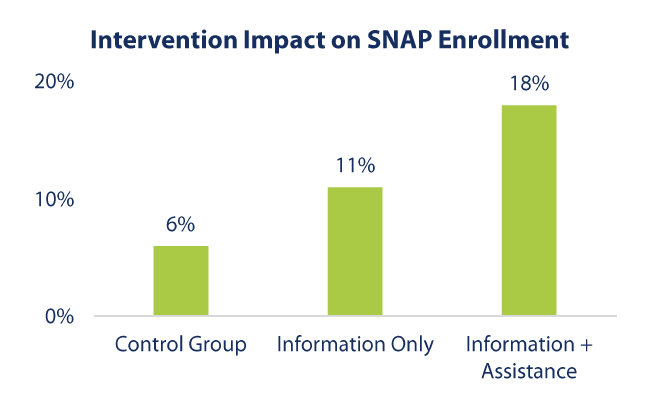Philadelphia, July 24, 2018 – Rigorous research showing that targeted outreach and application assistance triples Supplemental Nutrition Assistance Program (SNAP) enrollment among people ages 60 and over is being presented today at the National Bureau of Economic Research (NBER) Summer Institute in Cambridge, MA. The randomized experiment involving more than 30,000 seniors in Pennsylvania was conducted by Benefits Data Trust (BDT), a nonprofit committed to transforming how individuals in need access essential benefits and services, and economists at the Abdul Latif Jameel Poverty Action Lab (J-PAL). It was funded by a grant from the Alfred P. Sloan Foundation.
SNAP provides nutrition assistance to low-income families and individuals, and lifts millions out of poverty every year. But nationally more than five million older Americans are eligible but not enrolled.
“We wanted to know why millions of eligible older Americans are not receiving SNAP. This study conclusively shows that lack of information and the application process itself are significant barriers,” said Matthew Notowidigdo, Associate Professor of Economics at Northwestern University and co-author of the study with Amy Finkelstein, Professor of Economics at the Massachusetts Institute of Technology. “We found that providing information was enough for some people, but for many other people it wasn’t enough – they also needed application assistance,” Notowidigdo said.

The study found that informing older Pennsylvanians that they are likely eligible for SNAP and offering BDT’s assistance filling out the application over the phone tripled enrollment compared to a control group (18 percent vs. 6 percent). Providing information alone increased SNAP participation by 81 percent (11 percent vs. 6 percent).
Older adults enrolled through this intervention were eligible for an average of $1,300 in SNAP assistance per year to purchase food and had on average more than five chronic conditions. By contrast, the economists estimated the marginal cost of providing information and assistance was only $65 per enrolled household.
The Pennsylvania Department of Human Services (DHS) has taken multiple steps to streamline SNAP enrollment, partnered with BDT and J-PAL on this research, and provided support for the outreach and assistance. “Outreach and enrollment assistance help the Pennsylvanians we serve access and understand programs that will help themselves and their families lead healthy, fulfilling lives,” said Teresa Miller, Secretary of DHS. “This research on SNAP enrollment proves the effectiveness of these efforts. My department will continue to work with our partners to ensure that we are doing all we can to reduce the number of Pennsylvanians experiencing food insecurity.”
Implications for Healthcare and the Farm Bill
BDT also co-led two other peer-reviewed studies involving more than 54,000 Maryland residents on both Medicare and Medicaid. The research found SNAP participation reduced their odds of nursing home admission by 23 percent and of hospitalization by 14 percent. Based on this research, economists estimate that enrolling eligible people ages 65 and older in SNAP reduces annual healthcare costs by $2,120 per person. As a result, enrolling all eligible seniors in SNAP could save over $10 billion in annual healthcare costs.
“These research studies demonstrate that targeted SNAP outreach and enrollment assistance is a highly cost-effective way to improve health and reduce health care costs,” said Ginger Zielinskie, BDT’s President & CEO.
The new research findings are particularly timely with Congress now working to reconcile stark differences between the House and Senate farm bills. The bipartisan Senate bill strengthens SNAP, including making it easier for seniors to enroll, while the House bill would increase paperwork and eliminate or reduce food assistance for more than two million people.
###
About Benefits Data Trust
Benefits Data Trust (BDT) is a nonprofit organization committed to transforming how individuals in need access essential benefits and services. BDT envisions an efficient, cost-effective health and human services system that proactively connects individuals and families to the supports they need so that people are healthier and more economically secure, and communities are stronger. Since 2005, BDT has helped over 650,000 individuals apply for benefits, securing more than $7 billion to help pay for food, healthcare, housing, and other services. For more information, visit bdtrust.org.
